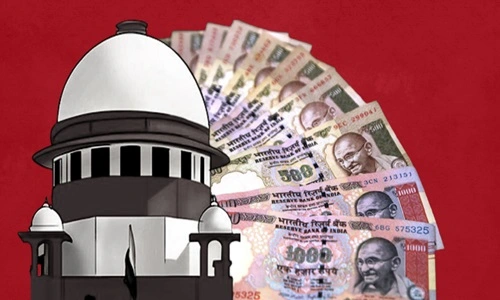Demonetisation is the act of stripping a currency unit of its status as legal tender. This means the old money in your wallet will no longer be valid and should be exchanged with new currencies. There have been multiple demonetisation occurrences in India across years, 1946, 1978, 2014, 2016 and then again in 2023. Usually, demonetisation is done to fight against black money, to make the counterfeit currency come down, and to promote digital transactions. It can also help curb inflation and reduce cash in the formal banking system. Though the intention is to create long-term economics these policies also resulted in temporary money shortages and economic recessions.
So here we are also going to discuss the advantages and disadvantages of Demonetisation which will further help have an overall view of what benefits or losses?

Advantages of Demonetization
1. Reduces Black Money and Corruption:
Demonetisation helps in black money and corruption eradication. When the government says certain high-value currency notes are no longer legal tender, those with huge unaccounted cash reserves will find it tough to convert it into legal money, compelling most to either unearth the cash they had hidden or lose it altogether. Thus, it helps in controlling black money and prevents corrupt activities in the economy.
2. Promotes Digital Transactions:
Another good thing about demonetization is that it encourages people to move toward digital transactions. Here cashless still means encouraging the online banking and digital wallets used by demonetization. This change brings transparency to financial transactions and reduces the cost of processing those transactions. They streamline the flow of money and make it harder to partake in any financial malpractice as all payments are systematically recorded.
3. Combats Counterfeit Currency:
Another reason for the demonetization process is to eliminate counterfeit currency. The government can throw out the fake currency in circulation by withdrawing old notes and bringing in new notes. This step saves our economy from the adverse effects of duplicate currency and ensures that we are dealing with genuine money.
4. Increases Tax Revenue:
Another benefit of demonetization is that it increases tax revenue. More money within the banking system leads to income declarations and recorded tax payments. This leads to increased tax collections, which in turn offers more resources to the government for expenditure on welfare and development projects. Greater tax revenue can also spur the economic growth of the nation.
5. Boosts Financial Inclusion:
The move by the government also improves the inclusion of more public in banking. It includes requiring old currency to be deposited in banks, likely leading many millions to obtain bank accounts and be attracted to the financial services industry. Everyone who previously dealt in cash has infinitely more access to financial resources than ever before. More equitable changes to banking access not only open the door for greater economic opportunity but also contribute to better support by all stakeholders towards creating a more inclusive financial landscape.
Disadvantages of Demonetization
1. Causes Panic and Inconvenience:
It has also a few disadvantages that come along with the benefits of demonetization. It has the immediate consequence of striking terror into our hearts and then inconvenience. The confusion and panic that spreads through people in the event of your currency being declared redundant. Exchanging old notes can be a laborious process, which has led to queues at banks and ATMs in many places. This was a hassle for many and disrupted daily life for some.
2. Economic Slowdown:
Of course, demonetization will eventually lead to a slowdown of the economy. The sudden disappearance of cash can put a halt to economic activity temporarily. The disruption in cash services is especially harmful to small businesses and the informal sector that are mainly dependent on cash transactions. This risks a temporary economic slowdown that potentially affects growth and productivity, which can add to the overall instability of the economy.
3. Liquidity Crunch:
Liquidity crunch due to demonetization is another big worry. Old currency notes are withdrawn all of a sudden, creating a dearth of cash in the market. This illiquidity makes it difficult to transact daily, which can result in reduced spending and investment. Liquidity crises cause a business to operate on a snap, while the same money is valued by the entire general public in times of economic distress.
4. Recalibration Costs:
One of the biggest and hidden costs related to phasing out and printing new currency notes is a recalibration of ATMs, and cash machines across the country to accept the new currency. This process consumes a lot of resources and time which is also an extra burden on the economy and the banks. ATMs will have to be recalibrated to allow withdrawals of the new notes – an expensive, labour-intensive process.
5. Short-term Fall in GDP:
A fall in GDP is another by-product of demonetization in the short term. The disruptions in cash flow and trading can result in economic activities slowing down for a certain period, causing the GDP to fall. This slowdown is caused by the lower amount of cash and then follows a drop in spending and investment.
Comparison Between Advantages and Disadvantages of Demonetisation
| Advantages | Disadvantages |
| Helps reduce black money and corruption by invalidating unaccounted cash. | Causes panic and inconvenience among people due to sudden invalidation of currency. |
| Encourages the use of digital transactions, making financial dealings more transparent. | Can slow down the economy temporarily, affecting small businesses and the informal sector. |
| Removes counterfeit currency from circulation, protecting the economy. | Creates a liquidity crunch, making daily transactions difficult. |
| This leads to higher tax revenue as more money enters the formal banking system. | Involves significant costs and effort to recalibrate ATMs and cash machines. |
| Brings more people into the formal banking system, improving financial inclusion. | This may result in a short-term decline in GDP due to disruption in cash flow. |
| Helps control inflation and reduce the informal economy. | Significantly impacts cash-dependent sectors like agriculture and small retail businesses. |

